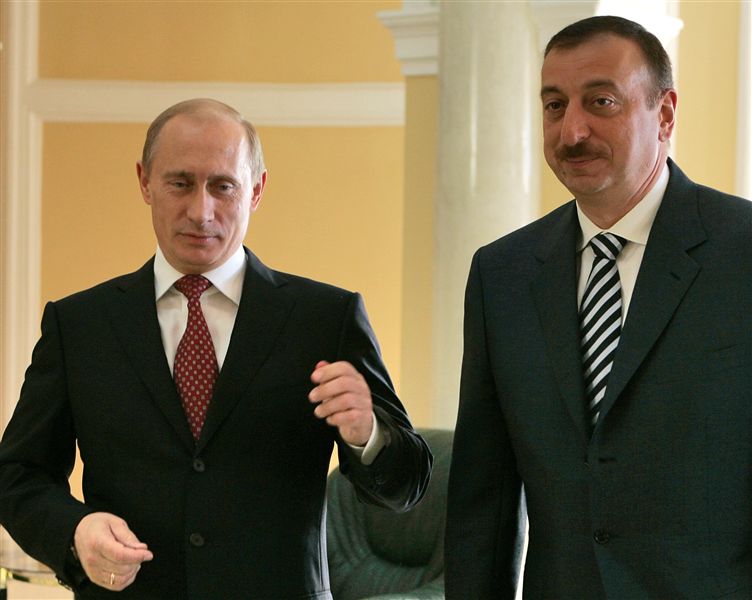
After Azerbaijan’s Presidential Election: The Look Ahead (Part Two)
Publication: Eurasia Daily Monitor Volume: 5 Issue: 207
By:

In the aftermath of the presidential election (see EDM, October 20) and looking several years ahead, Azerbaijan faces a new mixture of daunting security challenges. This will necessitate a strategic re-engagement of the United States with Azerbaijan and a long-overdue EU engagement.
Azerbaijan had advanced in the last few years from security consumer to a net provider of security, for the region and the West. It successfully stopped the penetration of violence-prone political Islam from abroad (also cooperating with Russia to stop such penetration into the North Caucasus); it contributes troops to NATO- and U.S.-led missions in Afghanistan, Kosovo, and Iraq (though it withdrew its unit from Kosovo following the Kosovo’s international recognition this year); it hosts U.S. radar reportedly watching Iranian and Russian territory (while having to put up with Russian radar in the country); it is an advocate for the Caspian countries’ legal right to build trans-Caspian pipelines bilaterally (opposed by Russia and Iran); and it supplies Georgia with low-cost natural gas while Russia cuts off the supplies or imposes extortionate prices (thereby hoping to provoke social unrest in Georgia). Azerbaijan performs these regional security functions unobtrusively, without political fanfare and at the risk of incurring Russia’s displeasure.
The unfolding regional dynamics, however, could checkmate some of those contributions to regional security and even threaten the basic national interests of Azerbaijan as an energy supplier to the West. Those challenges mainly stem from Moscow’s suddenly rediscovered willingness to use force and threats of force, exploiting the vacuum of Western power in the South Caucasus and the weakness of international law in Russia’s shadow.
Russia’s recent invasion of Georgia severely disrupted the operations of the energy transit corridor, on which Azerbaijan’s oil and gas exports to the West depend. Although the disruptions turned out to be temporary and business confidence is returning to that corridor, Azerbaijan has lost hundreds of millions of dollars worth of revenue as a result of Russia’s assault on Georgia. (Ironically, Russia also hurt its own ally by disrupting Armenia’s lifeline to the world through Georgia.) No country, international authority, or business corporation is asking Russia to compensate the damages. Instead, the West has silently tolerated Russia’s costly interference with the energy transit corridor, thus exposing the South Caucasus region and the West’s own energy security to new risks in the future. Involuntarily illustrating this dilemma, U.S. Deputy Secretary of State John Negroponte, recently in Baku, could not answer journalists’ constantly repeated questions about the United States’ readiness to support Azerbaijan against possible Russian threats (Press Availability in Baku, U.S. State Department release, October 2).
From Azerbaijan’s perspective, however, the United States remains the irreplaceable security provider of last resort and leader in energy diplomacy. To resume its formerly successful role in that regard, however, Washington needs to reverse its strategic disengagement from the region. That disengagement, unplanned and undeclared, has proceeded de facto in an incremental manner, under the pressure of U.S.-perceived priorities in other strategic theaters. With the United States thus distracted from this region, the European Union not yet capable of strategic engagement, and Russia emboldened, Azerbaijan is now facing vulnerability.
To forestall those risks the United States, the European Union, NATO, and Turkey need to make plans for protecting the energy transit corridor. Such measures could include government-backed risk insurance and credit guarantees for investments, unambiguous political commitments, and presence on the ground. The necessity of such measures can no longer be ignored if the West intends to revitalize its Caspian energy agenda. The specific measures would differ in the case of Azerbaijan, where military protection measures are not called for at this stage, from those in Georgia where a military presence is needed. In both countries, however, conventional and unconventional threats to the energy infrastructure must now be seriously considered and security planning adjusted accordingly for the region (see Colonel Jon Chicky, “Political-Military Implications of the Russia-Georgia War and Policy Recommendations,” CACI Forum, cleared by the National Defense University for circulation, September-October).
The change of administrations in Washington could also bring about a rebalancing of policy toward Azerbaijan. Both countries need an institutionalized process of consultations, reflecting Azerbaijan’s partnership with the West and the risks associated with that role in the South Caucasus. To retain and advance its influence, the United States needs to redress the glaring disproportion in the frequency and level of U.S. versus Russian visits to Azerbaijan. The situation in which medium-level U.S. officials are matched against Russia’s president, prime minister, and Gazprom CEO, all of whom are frequently meeting with Azerbaijan’s top leadership in the contest for attention and influence, is an unsustainable situation.
The United States also needs to demonstrate fair treatment of its close partner on the basis of shared strategic interests. By failing, however, to provide credit guarantees for the Kars-Tbilisi-Baku (KTB) railroad project, and opposing the Azerbaijan-initiated resolution on territorial integrity in the UN General Assembly, Washington seemed to take its close partner for granted, while allowing sectional lobbying to override those shared strategic interests. The U.S. policy process as such could only gain credibility through the removal of legislation under the Freedom Support Act’s Section 907, which penalizes the target of ethnic cleansing while implicitly excusing the perpetrator of that operation in the Armenia-Azerbaijan conflict. That unresolved conflict remains the most painful issue for Azerbaijani society, a fact often underappreciated by Western policy makers.
Following presidential elections in Armenia and Azerbaijan, the Russia-Georgia war, and high-level Turkey-Armenia contacts, momentum is building in the talks toward a stage-by-stage solution to the conflict between Armenia and Azerbaijan. This U.S.-encouraged process offers a chance for Armenia to extricate itself from strategic dependence on Russia and open direct outlets to the outside world. Sequencing is key, however. A premature opening of the Turkish border would remove Armenia’s incentive to proceed with the first stage of the peace process, namely, the withdrawal of Armenian forces from the Azeri districts around Upper Karabakh and the return of Azeri refugees to their homes. If military withdrawal and an opening of the border occur in the proper sequence, the forthcoming talks could usher in the first stage of the peace process and signal the peaceful reversal of a mass ethnic cleansing operation on Europe’s doorstep.




